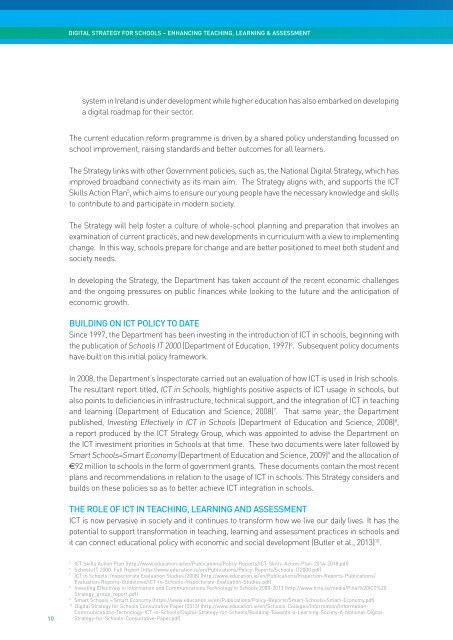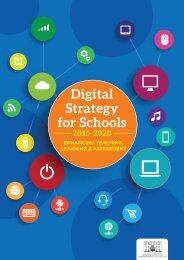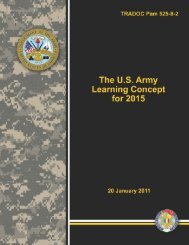Digital Strategy for Schools
TKmc0
TKmc0
You also want an ePaper? Increase the reach of your titles
YUMPU automatically turns print PDFs into web optimized ePapers that Google loves.
DIGITAL STRATEGY FOR SCHOOLS – ENHANCING TEACHING, LEARNING & ASSESSMENT<br />
system in Ireland is under development while higher education has also embarked on developing<br />
a digital roadmap <strong>for</strong> their sector.<br />
The current education re<strong>for</strong>m programme is driven by a shared policy understanding focussed on<br />
school improvement, raising standards and better outcomes <strong>for</strong> all learners.<br />
The <strong>Strategy</strong> links with other Government policies, such as, the National <strong>Digital</strong> <strong>Strategy</strong>, which has<br />
improved broadband connectivity as its main aim. The <strong>Strategy</strong> aligns with, and supports the ICT<br />
Skills Action Plan 5 , which aims to ensure our young people have the necessary knowledge and skills<br />
to contribute to and participate in modern society.<br />
The <strong>Strategy</strong> will help foster a culture of whole-school planning and preparation that involves an<br />
examination of current practices, and new developments in curriculum with a view to implementing<br />
change. In this way, schools prepare <strong>for</strong> change and are better positioned to meet both student and<br />
society needs.<br />
In developing the <strong>Strategy</strong>, the Department has taken account of the recent economic challenges<br />
and the ongoing pressures on public finances while looking to the future and the anticipation of<br />
economic growth.<br />
BUILDING ON ICT POLICY TO DATE<br />
Since 1997, the Department has been investing in the introduction of ICT in schools, beginning with<br />
the publication of <strong>Schools</strong> IT 2000 (Department of Education, 1997) 6 . Subsequent policy documents<br />
have built on this initial policy framework.<br />
In 2008, the Department’s Inspectorate carried out an evaluation of how ICT is used in Irish schools.<br />
The resultant report titled, ICT in <strong>Schools</strong>, highlights positive aspects of ICT usage in schools, but<br />
also points to deficiencies in infrastructure, technical support, and the integration of ICT in teaching<br />
and learning (Department of Education and Science, 2008) 7 . That same year, the Department<br />
published, Investing Effectively in ICT in <strong>Schools</strong> (Department of Education and Science, 2008) 8 ,<br />
a report produced by the ICT <strong>Strategy</strong> Group, which was appointed to advise the Department on<br />
the ICT investment priorities in <strong>Schools</strong> at that time. These two documents were later followed by<br />
Smart <strong>Schools</strong>=Smart Economy (Department of Education and Science, 2009) 9 and the allocation of<br />
€92 million to schools in the <strong>for</strong>m of government grants. These documents contain the most recent<br />
plans and recommendations in relation to the usage of ICT in schools. This <strong>Strategy</strong> considers and<br />
builds on these policies so as to better achieve ICT integration in schools.<br />
THE ROLE OF ICT IN TEACHING, LEARNING AND ASSESSMENT<br />
ICT is now pervasive in society and it continues to trans<strong>for</strong>m how we live our daily lives. It has the<br />
potential to support trans<strong>for</strong>mation in teaching, learning and assessment practices in schools and<br />
it can connect educational policy with economic and social development (Butler et al., 2013) 10 .<br />
10<br />
5<br />
ICT Skills Action Plan (http://www.education.ie/en/Publications/Policy-Reports/ICT-Skills-Action-Plan-2014-2018.pdf)<br />
6<br />
<strong>Schools</strong> IT 2000: Full Report (http://www.education.ie/en/Publications/Policy-Reports/<strong>Schools</strong>-IT2000.pdf)<br />
7<br />
ICT in <strong>Schools</strong>: Inspectorate Evaluation Studies (2008) (http://www.education.ie/en/Publications/Inspection-Reports-Publications/<br />
Evaluation-Reports-Guidelines/ICT-in-<strong>Schools</strong>-Inspectorate-Evaluation-Studies.pdf)<br />
8<br />
Investing Effectively in In<strong>for</strong>mation and Communications Technology in <strong>Schools</strong> 2008-2013 (http://www.ncte.ie/media/Final%20ICT%20<br />
<strong>Strategy</strong>_group_report.pdf)<br />
9<br />
Smart <strong>Schools</strong> = Smart Economy (https://www.education.ie/en/Publications/Policy-Reports/Smart-<strong>Schools</strong>=Smart-Economy.pdf)<br />
10<br />
<strong>Digital</strong> <strong>Strategy</strong> <strong>for</strong> <strong>Schools</strong> Consultative Paper (2013) (http://www.education.ie/en/<strong>Schools</strong>-Colleges/In<strong>for</strong>mation/In<strong>for</strong>mation-<br />
Communications-Technology-ICT-in-<strong>Schools</strong>/<strong>Digital</strong>-<strong>Strategy</strong>-<strong>for</strong>-<strong>Schools</strong>/Building-Towards-a-Learning-Society-A-National-<strong>Digital</strong>-<br />
<strong>Strategy</strong>-<strong>for</strong>-<strong>Schools</strong>-Consultative-Paper.pdf)




